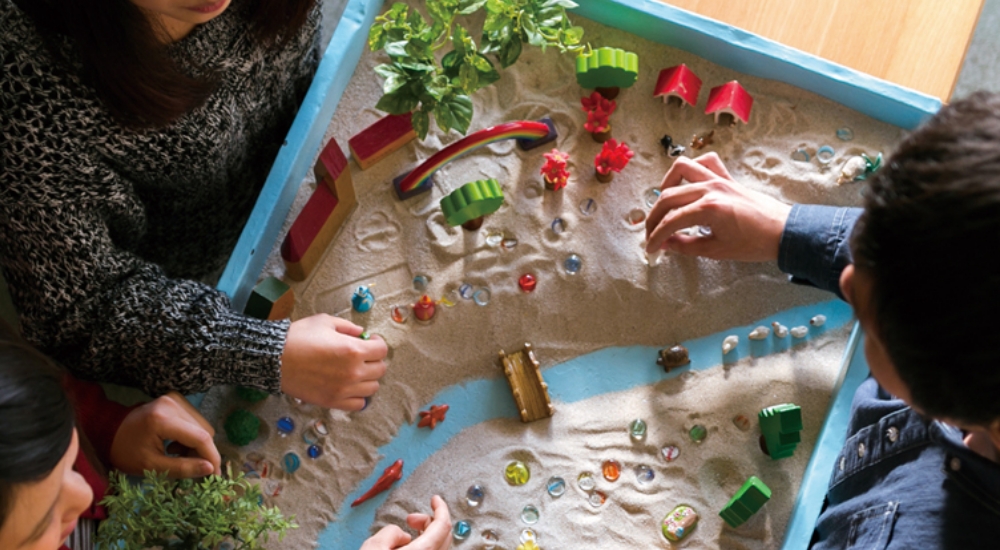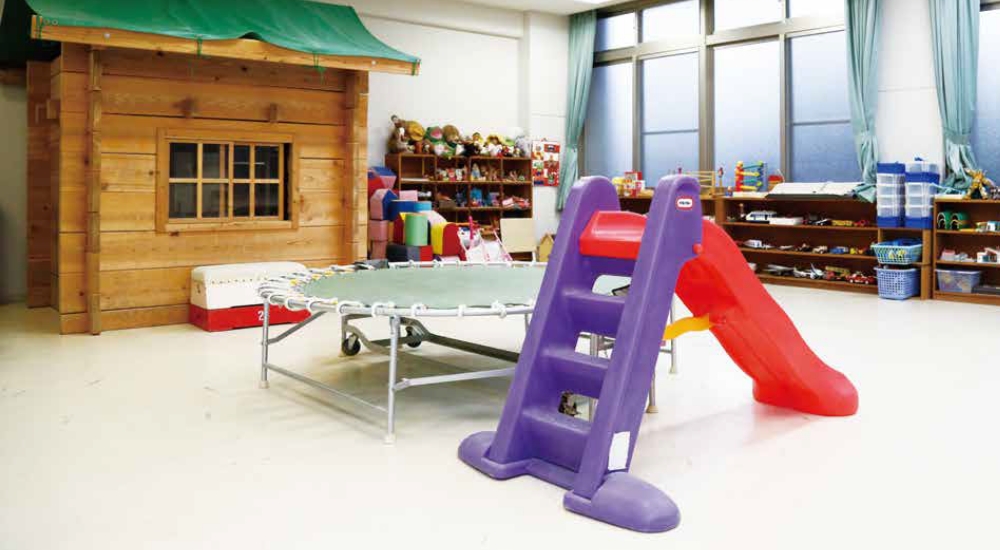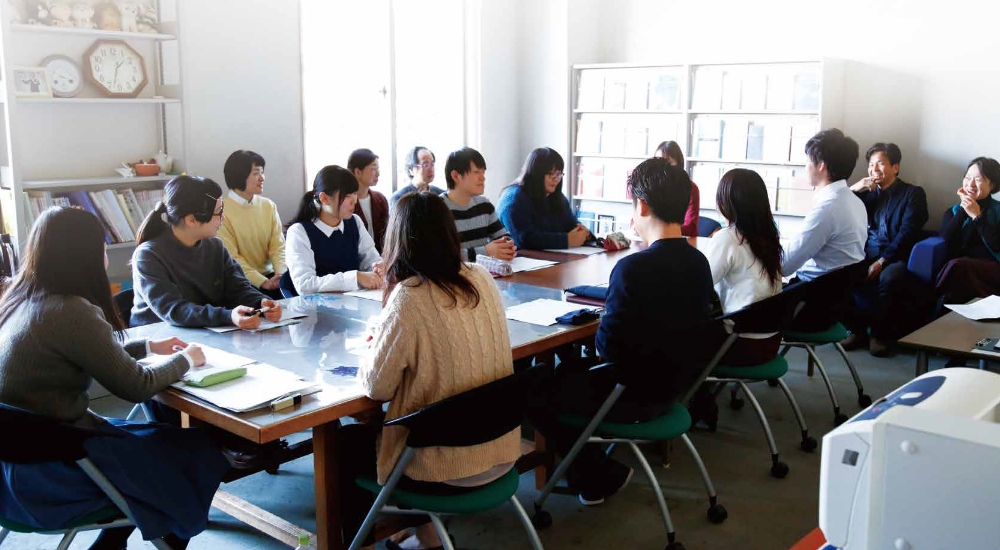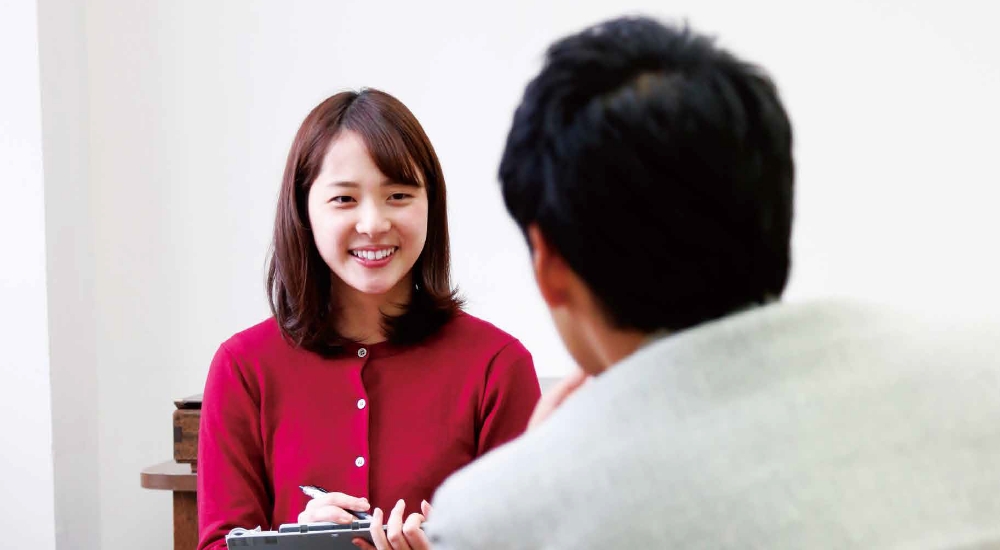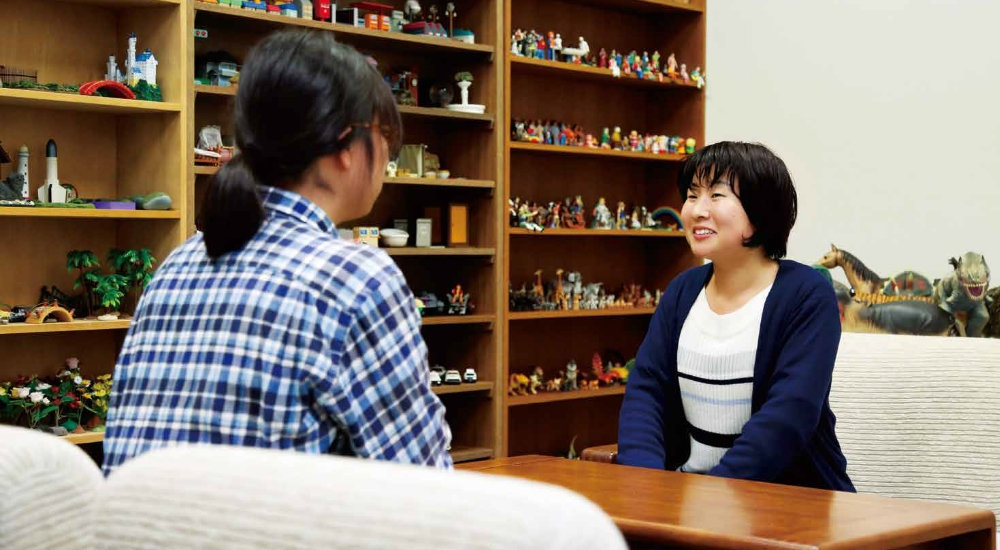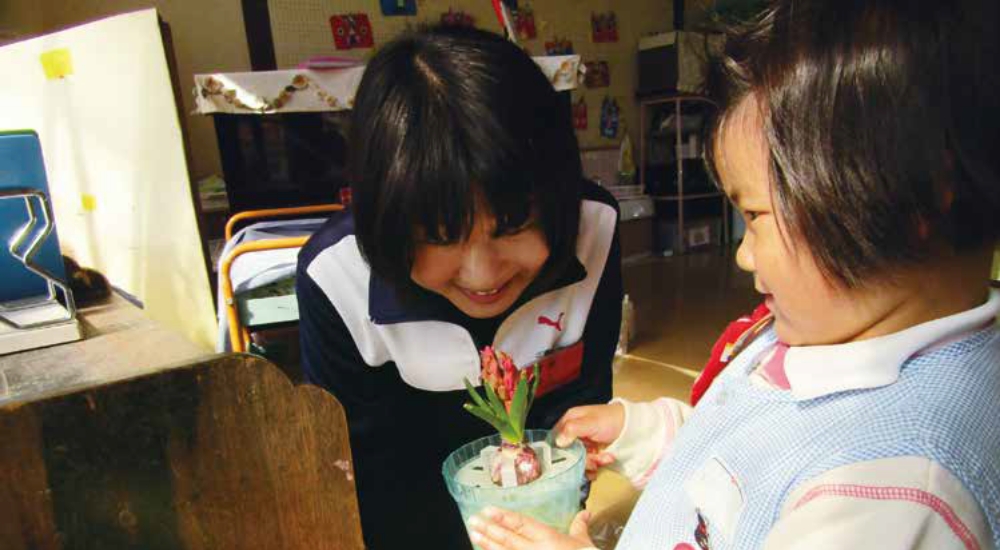Graduate Schools Graduate School of Clinical Human Studies
English translation in progress. Thank you for waiting.
Contents
Learning Key Points
Preparing psychology professionals who offer genuine, empathic care.
Building on the legacy of Professor Hayao Kawai, who first introduced sandplay therapy to Japan, our program immerses students in the essence of clinical psychology, beginning with human-to-human encounters. We train psychology professionals capable of connecting with people at the deepest level. Students acquire advanced expertise and the skills and professional attitudes required to meet the needs of diverse fields where clinical psychology is applied, including educational and medical settings. The program offers extensive practical training, particularly in hospital and child clinical settings, fostering respect for each individual, including children. By understanding the depth of the human psyche beyond rational comprehension and cultivating a sense of awe, students develop the capacity to accept both themselves and others.
Enhancing practical skills through small-class instruction and extensive clinical training
Small-Class Instruction
With only eight students per year and six dedicated faculty members, we maintain an exceptionally small class size. This setting fosters personalized guidance and in-depth discussions, ensuring that each student receives close academic support.
Clinical Practice
Our University's Counseling Room provides extensive opportunities for practical training in client interviews, which form the foundation of clinical psychology practice. A well-established supervision system supports these sessions, allowing students to meet with clients, conduct interviews, and explore the depths of the human mind while learning psychotherapy in a truly dynamic, real-world setting.
Extensive, Well-structured Training System
Affiliated institutions such as a kindergarten, elementary school, hospital, and children's homes provide students with diverse training environments. In addition, collaboration with local Education Support Centers and other community resources enables students to deepen their practical experience through off-campus placements.
Distinctive Features of the Graduate School
The Program offers comprehensive curricula designed to meet the requirements for both Clinical Psychologist and Certified Public Psychologist qualifications.
Accredited as a Type 1 Graduate Program for Training Clinical Psychologists, our curriculum fully meets the requirements for both the Clinical Psychologist and Certified Public Psychologist qualifications.
In 2015, the Certified Psychologist Act was enacted, establishing a national qualification for certified public psychologists. Students who complete the designated courses at the graduate level and pass the national examination are eligible for this qualification.
The Certified Clinical Psychologist credential, on the other hand, was established in cooperation with the Ministry of Education, Culture, Sports, Science and Technology, and is granted to those who pass the qualifying examination administered by the Japanese Certification Board for Clinical Psychologists.
Both are highly versatile qualifications that enable professionals to work across diverse fields, including healthcare, education, welfare, the judiciary, and industry.
Today, the majority of practicing psychologists hold both licenses.
Our graduate school offers curricula that fully support preparation for both qualifications.
- Eight students supported by six faculty members. With a strictly small class system, we cultivate strong, practical skills in clinical psychology.
Through this intensive, individualized system, we provide an educational setting that enables precise guidance and meaningful dialogue. Clinical psychology is not merely a set of techniques; it is a comprehensive human science that requires personal attitude, self-awareness, and the capacity for deep insight.
Each student engages in close, one-on-one discussions and debates with faculty members, developing a profound understanding of human nature while refining both expertise and sensibility.
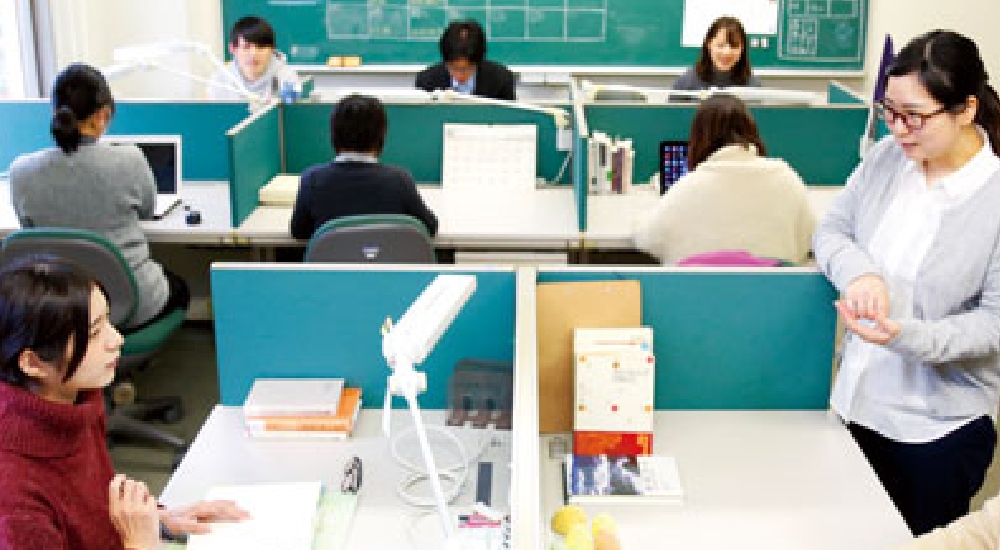
- A Pioneering Spirit: Introducing Sandplay Therapy to Japan and Embracing Flexible Perspectives on Human Nature
The late Dr. Hayao Kawai, former Commissioner for Cultural Affairs of Japan, laid the foundation for clinical psychology and made remarkable contributions to its development. During his tenure as an associate professor at Tenri University, he traveled to Switzerland where he introduced sandplay therapy to Japan. Today, this therapeutic approach is widely practiced in diverse clinical settings.
Our tradition of innovation is rooted in a client-centered philosophy—a spirit that continues to shape both our clinical practices and our approach to graduate education.
- Extensive Clinical Training with Children
In the wake of the COVID-19 pandemic, cases of child abuse have risen, and school absenteeism has increased by 30% compared to 2021. To address these pressing issues, our program provides abundant opportunities for clinical training with children. Students engage in practicum at the Tenri City Education Center (Practicum in Psychology 4), the Tenri Yotokuin Child Welfare Facility (Practicum in Psychology 5), and our affiliated Counseling Room, where they practice play therapy (Advanced Practical Training in Clinical Psychology 1 (Practicum in Psychology 2) and Seminar in Psychology, Practical Training in Psychology).
Beyond psychodynamic psychotherapy, students also study child-focused cognitive-behavioral approaches such as Social Skills Training (SST), aiming to cultivate a well-rounded capacity for child support as professional psychologists. - Tenri University Counseling Room: Large Playroom
For children up to the upper elementary grades, play therapy is primarily conducted in this large playroom, which is equipped with a sandbox, water area, and a variety of toys. At Tenri University, students can learn play therapy thoroughly, starting from the basics.

Featured Classes
- Case Conference
This forum allows graduate students to present cases from their psychotherapy sessions for multifaceted discussion. It not only enables the therapist in charge to deepen his or her understanding of the case but also offers all participants an opportunity to gain fresh insights.

-
Supervision
Graduate students receive one-on-one supervision on their clinical cases from experienced clinical psychologists, certified public psychologists, and psychiatrists. By working with specialists both on and off campus, they are able to further enhance the quality of their clinical training.
- Psychotherapy Session
Graduate students conduct therapy sessions with actual clients at the University's Counseling Room. Through this hands-on practice, they cultivate the essential attitudes and perspectives expected of clinical psychologists and certified public psychologists.

- Off-Campus Practicum
By collaborating with municipal educational support centers, kindergartens, elementary schools, hospitals, and child welfare facilities, students participate in weekly practicum sessions at each site. These experiences allow them to gain practical skills while broadening their understanding of human development and behavior.

Employment Results and Qualifications
National Examination for Certified Public Psychologists
Pass Rate in 2022-2023 Academic Year
National Examination for Certified Public Psychologists 2022-2023 Academic Year
Tenri University Pass Rate 100%
Nationwide Pass Rate 48.3%
Certification Examination for Certified Clinical Psychologists
Pass Rate in 2022-2023 Academic Year
Certification Examination for Certified Clinical Psychologists 2022-2023 Academic Year
Tenri University Pass Rate 100%
Nationwide Pass Rate 65.4%
Graduates of our program consistently surpass the national average on certification exams.
Through a curriculum that values both dialogue and hands-on practice, and that respects each student's unique character, we help students cultivate the essential mindset of a clinician, stay motivated, and bring out their full professional abilities.
Career Paths after Graduation
Graduates can pursue careers as professional psychologists in diverse fields such as education, healthcare, and social welfare.
Certified Public Psychologist: To obtain this national qualification, graduates must pass the national Examination for Certified Public Psychologists after completing the master's program.
Clinical Psychologist: To obtain this qualification, graduates must pass the certification examination administered by the Japanese Certification Board for Clinical Psychologists after completing the master's program.
Career Options
Graduates may work in roles such as:
- Psychologists in government agencies
- School counselors,
-Full-time psychologists at child welfare institutions
-Full-time psychologists in psychiatric hospitals
Other related positions
Employment Record (Full-time Positions)
Central Child and Family Counseling Office of Nara Prefecture
Tenri City Education Center
Kyoto City Hall
Nishinomiya City Board of Education
Inpaku Children’s Home (Social Welfare Corporation)
Tenri Yotokuin Children’s Home (Social Welfare Corporation)
Shiraume Gakuen Children’s Home (Child Welfare Facility)
Kyoto City Child Guidance Center
Tenri Hospital
Manyo Clinic
and others
Obtainable Qualifications
- Licensed Clinical Psychologist
- Certified Public Psychologist
Voices of Alumni
Two-Year Study Plan
Step.1
続きを読むAcquire Fundamental Theories and Attitudes toward Others
In the spring semester of the first year, students learn the fundamentals of clinical interviewing and psychological assessment and begin their initial training through Basic Clinical Practicum and Applied Practicum in Psychology. They also start preparing for their master’s thesis by developing a research plan, reviewing literature, and formulating research questions.
Step.2
続きを読むLearn Advanced Theories and Methods of Clinical Inquiry
While deepening their understanding of clinical theories, students provide psychotherapy in the
University’s Counseling Room. Through supervision and case conferences, they cultivate fundamental therapeutic attitudes, perspectives for case formulation, and practical techniques as developing clinicians.
Step.3
続きを読むFurther Explore Issues Related to Human Growth and Development
In the University’s Counseling Room, students are required to work with a minimum of three clients and present their cases four to five times in case conferences. Through multi-faceted discussions, they cultivate professional attitudes and strengthen their clinical competence. A distinctive strength of the program is the large number of clients who visit the Counseling Room, offering students abundant opportunities to gain meaningful clinical experience.
Step.4
続きを読むCultivate Clinical Competence and Professional Qualities Through Practice and Reflection
As a part of the master’s thesis process, students begin by presenting a literature review and research plan, which they then refine and finalize. Upon receiving approval from the University’s ethics review committee, they proceed with data collection. Drawing on their findings, students conduct analysis and discussion, and under close faculty guidance, bring their thesis to completion.
- Two-Year Curriculum Overview
- Academic year 2022-2023 Graduate School of Clinical Human Studies Research Supervision Schedule
Curriculum
Emphasis on Dialogue and Practice—Two years of study in clinical psychology within a rich and supportive learning environment.
Intensive foundational courses grounded in clinical practice are made possibly through small group instruction.
Three Key Concepts
- Build a solid foundation in clinical psychology and prepare for practical training
- Develop a professional perspective for understanding the human mind
- Engage in real clinical practice to refine practical skills
- Curriculum tree (2022-2023 Academic year)
- Curriculum map (2022-2023 Academic year)
- List of Class Subjects (2022-2023 Academic year)
- Master's Thesis Process
Faculty list
Education Policy
Admission Policy
In order to fulfill the educational goals of the Graduate School of Human Sciences, Department of Clinical Psychology, we seek students with the following qualities:
1. (Motivation, Attitude) Those who have a genuine interest in the human mind and who are distinguished by compassion and empathy toward others.
2. (Attitude, Action) Those who aspire to engage in aid activities with a humble attitude.
3. (Knowledge, Skills, Motivation) Those who are proactive in acquiring specialized knowledge and skills in mental health care.
◇ Specifically, we welcome applicants who:
◇ Aspire to become a Certified Public Psychologist
◇ Aspire to become a Licensed Clinical Psychologist
The examination will be conducted according to the entrance examination method for graduate school admissions.Curriculum Policy
To cultivate the advanced expertise required of future clinical psychologists, the program is structured from the perspective of Clinical Human Studies—an approach that emphasizes empathizing with the human mind, deeply reflecting on the essence of human existence, and understanding human beings as they truly live.
On this foundation, the program offers a systematic curriculum of lectures and seminars. In addition, placing importance on direct and meaningful engagement with others, students undertake clinical psychology training at the University’s affiliated Counseling Room and participate in practicum courses across a variety of professional settings.
Overall, the curriculum fulfills the requirements for eligibility to sit for the Certified Public Psychologist (national qualification) examination and the Licensed Clinical Psychologist examination (administered by the Foundation of the Japanese Certification Board for Clinical Psychologists).
Furthermore, to deepen their specialized knowledge and develop research competence, students take advanced seminars in clinical psychology and complete a master’s thesis as the culmination of their studies.Diploma Policy
The master’s degree in clinical psychology will be awarded to students who have acquired the following knowledge and abilities:
1. (Knowledge, Skills, Action) Those who have acquired the ability to practically apply the knowledge and skills required for professional practice as a Certified Public Psychologist and Licensed Clinical Psychologist.
2. (Motivation, Attitude, Action) Those who have acquired the capacity to sincerely address psychological issues with the aim of helping individuals lead more fulfilling lives.
3. (Skills) The competence to engage in interprofessional collaboration in the context of community support.
4. (Thought, Creativity) The ability to identify psychosocial issues in contemporary society and explore clinical psychological interventions to addressing them.

